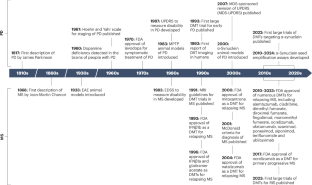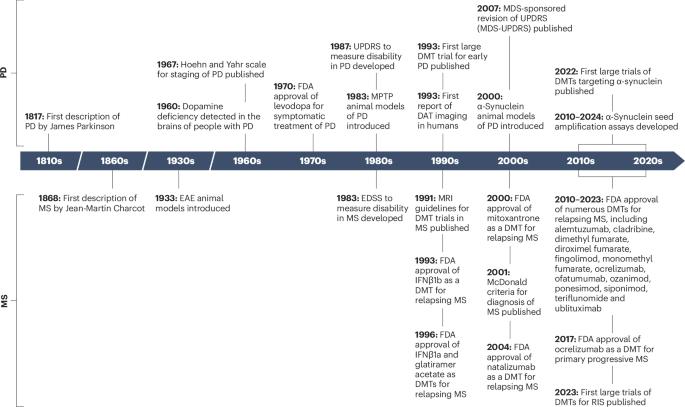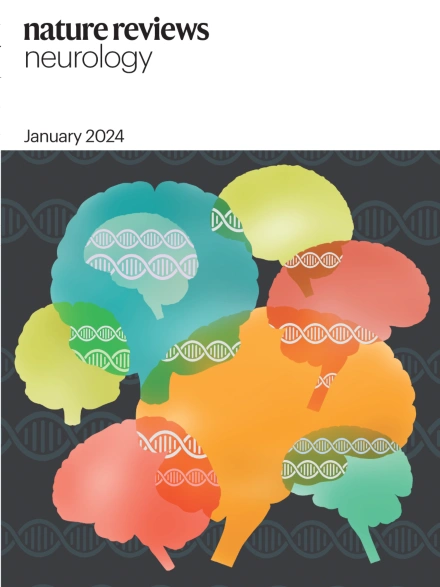帕金森病的疾病调节疗法:多发性硬化症的启示
IF 28.2
1区 医学
Q1 CLINICAL NEUROLOGY
引用次数: 0
摘要
开发针对神经系统疾病的疾病修饰疗法(DMT)是现代神经病学的一个重要目标,许多慢性神经系统疾病都面临着类似的挑战。多发性硬化症(MS)领域已经取得了重大进展,一系列治疗复发性多发性硬化症的 DMTs 已获批准,并推出了首批治疗进展性多发性硬化症的 DMTs。相比之下,帕金森病(PD)患者仍然缺乏此类治疗选择,只能依赖已有几十年历史的治疗方法缓解症状。为了满足这一尚未满足的需求,2022 年 11 月在加拿大多伦多举行了一次国际研讨会,多发性硬化症和帕金森病的国际研究人员和专家共同讨论了推进 DMT 开发的策略。在这篇路线图文章中,我们重点介绍了研讨会的讨论内容,主要涉及治疗靶点和临床前模型、疾病谱和亚分类以及临床试验设计和结果测量。从这些讨论中,我们提出了利用从多发性硬化症的治疗开发中吸取的经验教训,在帕金森病中进行新探索或更深入探索的领域。此外,我们还指出了帕金森病和多发性硬化症领域需要共同应对的挑战,以进一步推动有效 DMTs 的发现和开发。本文章由计算机程序翻译,如有差异,请以英文原文为准。


Disease-modifying therapies for Parkinson disease: lessons from multiple sclerosis
The development of disease-modifying therapies (DMTs) for neurological disorders is an important goal in modern neurology, and the associated challenges are similar in many chronic neurological conditions. Major advances have been made in the multiple sclerosis (MS) field, with a range of DMTs being approved for relapsing MS and the introduction of the first DMTs for progressive MS. By contrast, people with Parkinson disease (PD) still lack such treatment options, relying instead on decades-old therapeutic approaches that provide only symptomatic relief. To address this unmet need, an in-person symposium was held in Toronto, Canada, in November 2022 for international researchers and experts in MS and PD to discuss strategies for advancing DMT development. In this Roadmap article, we highlight discussions from the symposium, which focused on therapeutic targets and preclinical models, disease spectra and subclassifications, and clinical trial design and outcome measures. From these discussions, we propose areas for novel or deeper exploration in PD using lessons learned from therapeutic development in MS. In addition, we identify challenges common to the PD and MS fields that need to be addressed to further advance the discovery and development of effective DMTs. Major advances have been made in disease-modifying therapies for multiple sclerosis, but people with Parkinson disease still lack such treatment options. Drawing on discussions from a symposium held in November 2022, this Roadmap proposes areas for exploration in Parkinson disease using lessons learned from therapeutic development in multiple sclerosis.
求助全文
通过发布文献求助,成功后即可免费获取论文全文。
去求助
来源期刊

Nature Reviews Neurology
医学-临床神经学
CiteScore
29.90
自引率
0.80%
发文量
138
审稿时长
6-12 weeks
期刊介绍:
Nature Reviews Neurology aims to be the premier source of reviews and commentaries for the scientific and clinical communities we serve. We want to provide an unparalleled service to authors, referees, and readers, and we work hard to maximize the usefulness and impact of each article. The journal publishes Research Highlights, Comments, News & Views, Reviews, Consensus Statements, and Perspectives relevant to researchers and clinicians working in the field of neurology. Our broad scope ensures that the work we publish reaches the widest possible audience. Our articles are authoritative, accessible, and enhanced with clearly understandable figures, tables, and other display items. This page gives more detail about the aims and scope of the journal.
 求助内容:
求助内容: 应助结果提醒方式:
应助结果提醒方式:


